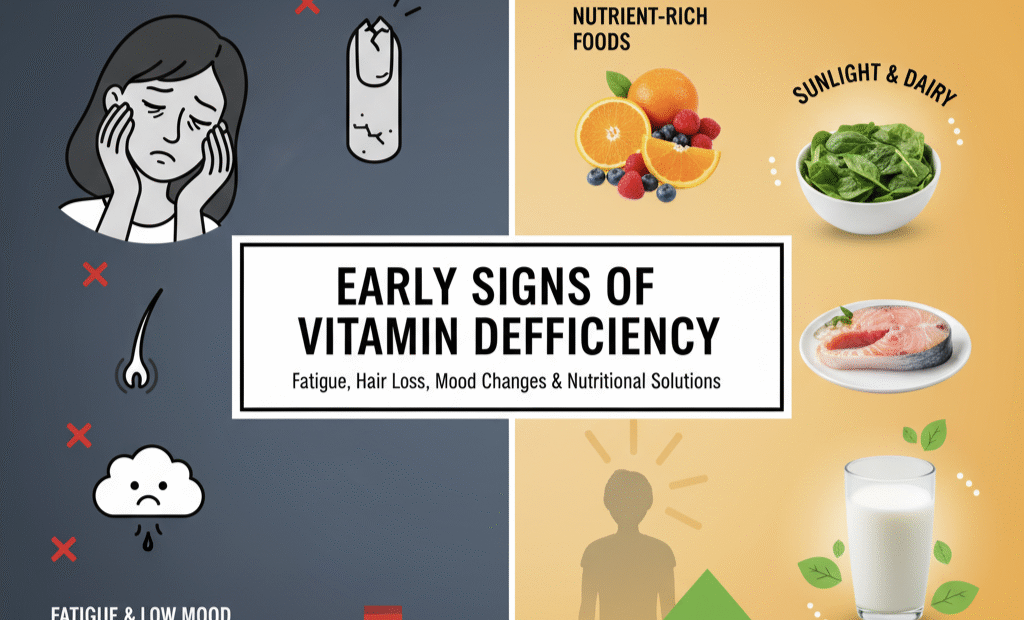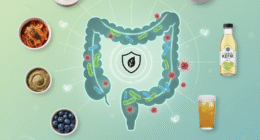Early Signs of Vitamin Deficiency
Vitamins play a crucial role in maintaining your body’s energy, immunity, and organ function. When your body doesn’t get enough essential vitamins, it can lead to various symptoms that affect your skin, hair, mood, and overall health. Recognizing the early signs of vitamin deficiency can help you take corrective action through diet and supplements before more serious problems develop.
Why Vitamin Deficiency Happens
Vitamin deficiency often occurs due to poor diet, stress, certain medications, or medical conditions that affect nutrient absorption. People who follow restrictive diets, older adults, and individuals with digestive disorders are especially prone to deficiencies. Since early symptoms can be mild, they are often ignored until they become more severe.
Common Early Signs of Vitamin Deficiency
1. Fatigue and Low Energy
Feeling constantly tired or lacking energy may indicate deficiencies in vitamins B12, B6, or iron. These nutrients are essential for producing red blood cells and converting food into energy. If fatigue persists despite enough sleep, it may be time to evaluate your diet and nutrient intake.
2. Weak Nails and Hair Loss
Brittle nails and hair thinning are common signs of biotin (vitamin B7) or iron deficiency. Biotin supports keratin production, the protein responsible for hair and nail strength. Iron deficiency can also lead to hair loss because of reduced oxygen supply to hair follicles.
3. Pale or Dry Skin
A lack of vitamins A, C, or E can make your skin appear dull, flaky, or dry. Vitamin A supports skin cell regeneration, while vitamin C promotes collagen production and skin elasticity. Deficiency in these vitamins can also slow wound healing and make the skin more prone to irritation.
4. Cracked Lips and Mouth Sores
Cracks at the corners of your mouth or frequent mouth ulcers may suggest a deficiency in B vitamins, especially B2 (riboflavin) and B3 (niacin). These vitamins support healthy skin and tissue repair, so a shortage can lead to inflammation and irritation around the lips.
5. Muscle Weakness or Cramps
Muscle cramps or weakness could be linked to low levels of vitamin D, magnesium, or calcium. These nutrients are vital for proper muscle function and nerve communication. Spending time in sunlight and eating fortified foods can help maintain healthy vitamin D levels.
6. Mood Changes and Depression
Vitamins B12, B9 (folate), and D have a direct impact on brain health. Deficiencies in these vitamins can lead to irritability, anxiety, or mild depression. Omega-3 fatty acids and a nutrient-rich diet also support a balanced mood and mental clarity.
7. Frequent Infections or Slow Healing
Weak immunity or slow wound healing can be a sign of low vitamin C or zinc levels. Vitamin C strengthens the immune system and supports collagen synthesis, while zinc plays a role in tissue repair and immune defense.
How to Prevent Vitamin Deficiency
- Eat a balanced diet rich in fruits, vegetables, whole grains, and lean proteins.
- Include colorful produce to cover a wide range of vitamins and minerals.
- Spend time in sunlight to boost vitamin D levels naturally.
- Limit processed foods and refined sugars that lack essential nutrients.
- Consider multivitamin supplements if recommended by your healthcare provider.
When to See a Doctor
If you experience persistent fatigue, unexplained hair loss, muscle pain, or skin changes, consult a healthcare professional. Blood tests can identify deficiencies so you can address them early with proper treatment or supplementation.
Conclusion
Early detection of vitamin deficiency is key to maintaining long-term health. Paying attention to your body’s signals—such as fatigue, brittle nails, or mood changes—can help you make timely dietary adjustments. A balanced diet, regular exercise, and healthy lifestyle choices can ensure your body gets the nutrients it needs for optimal performance and vitality.









